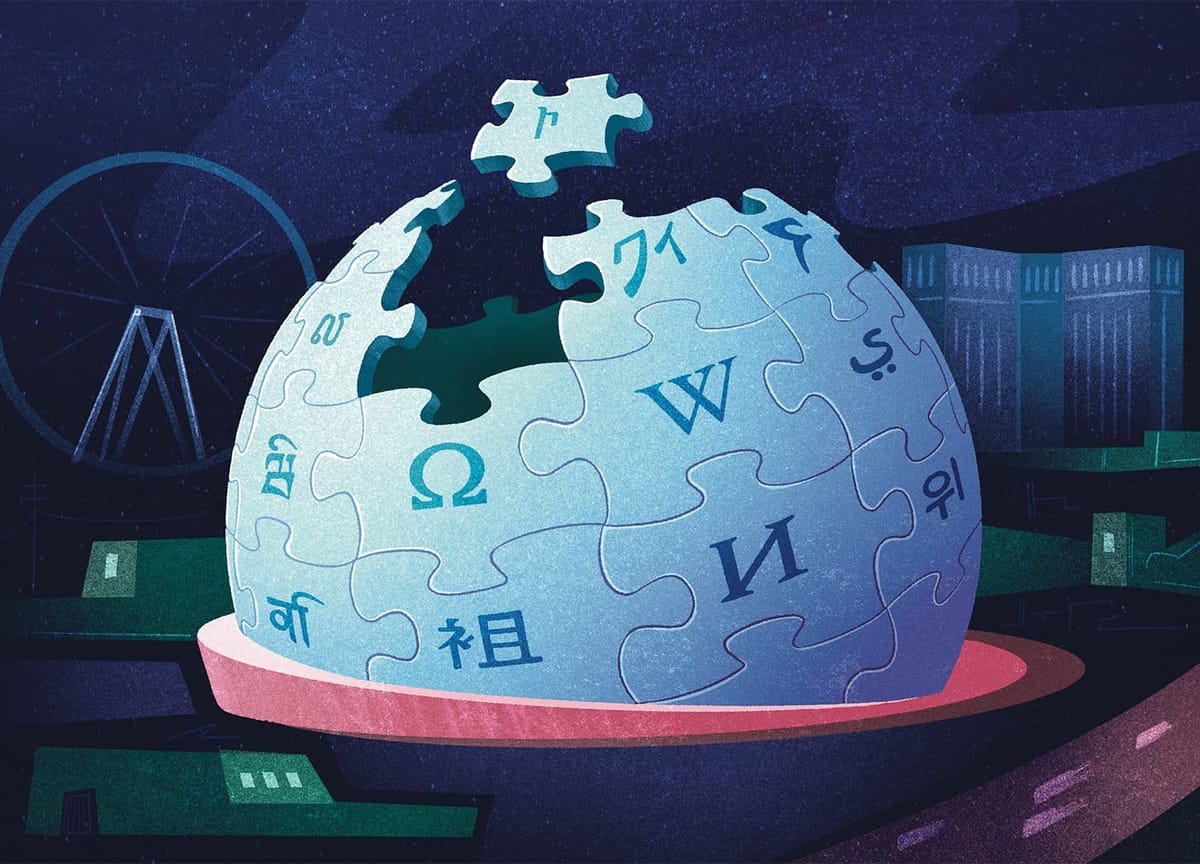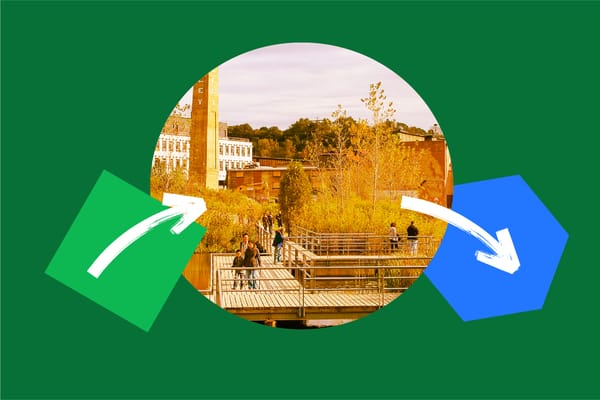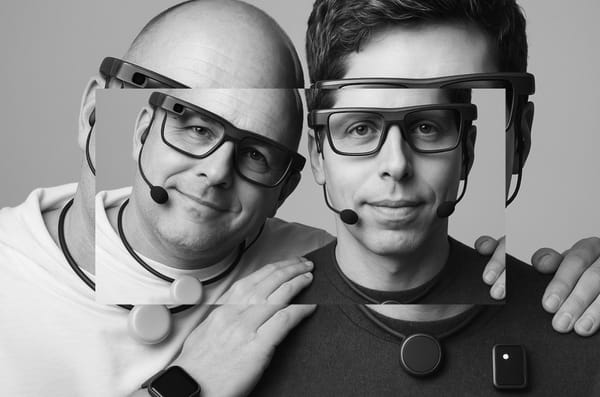Round and Round
Updates on the MSG Sphere, Wikipedia, and other recent Frontier Magazine stories

Last summer, I wrote about the MSG Sphere, a new high-tech arena in Las Vegas created at the behest of entertainment mogul James L. Dolan. As is often the case, I was early; despite linking to dozens of stories, so much has happened in the Sphere saga since. And I remain fascinated by the mixture of hubris, eye-opening technology, artistic co-optation, and bad urbanism that it represents.
First, the Sphere itself opened in late September. Reviewers—of the building; of the inaugural U2 performances; of the first offering from its related content studio, a Darren Aronofsky nature film—were uniformly impressed by the technology and more ambivalent about the art on offer and what the development means. Charlie Warzel, writing in The Atlantic, describes the Sphere as “the architectural embodiment of ridiculousness” and suggests it’s the apotheosis of our evolving relationship with screens: “documenting has become inextricable from living.” By the end of the U2 show, pop-music critic Jon Caramanica noted “the tension that remained, even at the end of the night, unresolved: Was this a big show or a small one? Was it selling intimacy or grandeur? Was it extraordinarily mundane, or mundanely extraordinary? Kriston Capps called it “the building of the year, the decade, possibly the century” and rounded up even more reactions.
Meanwhile, in east London, activism from Stratford community members—and an astroturf campaign by the owners of nearby O2 Arena—pressured local officials enough that in November Mayor Sadiq Khan rejected the company’s planning application. His stated grounds were similar to the concerns I raised about the Las Vegas Sphere’s lack of neighborliness: “the Mayor has seen independent evidence that shows the current proposals would result in an unacceptable negative impact on local residents.” (This despite the company offering neighbors free blackout curtains.) Though Michael Gove, the UK’s housing secretary , tried to bring decision-making authority for the plan into his office, ostensibly to overrule Khan, Dolan and his associates threw in the towel, abandoned their plans, and are looking to sell the site.
Sphere Entertainment is likely eager to find additional venues, hoping that scale will help offset financial losses—about $100 million in the quarter leading up to September 30, 2023. Right now, any content created by the Sphere studio’s new high-tech cameras can be played on precisely one screen, making it hard to recoup undoubtedly high production costs. But conversations have apparently stalled in South Korea, where MSG hoped to build a “K-Pop Sphere,” and Saudi Arabia (where talks never stall); Dolan is now negotiating with Abu Dhabi (because of course).
As of this writing, the only additional musical residencies that have been announced are Phish and Dead & Company, and the only artists listed for exterior commissions on the Sphere website are men . Say what you will about those choices artistically; from an audience-building perspective, they seem extremely narrow. How long can something so creatively limited, with such high operating costs, really last?
The Truth Is Out There
A year ago, I wrote a love letter to Wikipedia, and in so doing I unintentionally deepened that love—of the current events portal and Weeklypedia, in particular. A new favorite use is to open the app when I’m somewhere new, tap its Places tab, and read about what’s around me.
There have been two big English-language stories about Wikipedia since that newsletter issue. Last summer, the New York Times Magazine published a story about the site’s “moment of truth” as it adds reckoning with LLMs like ChatGPT to the usual squabbles between editors. (See, for example, this story about a breakaway wiki devoted to highways.) As new tools from OpenAI, Perplexity, and startups scrape Wikipedia and serve its information to users without sending them on to Wikipedia itself, how will the nonprofit find new volunteer contributors and solicit donations? And as these tools make generating plausible-sounding content instantaneous, how will Wikipedia’s human editors keep up? “No one I spoke with in the tech community seemed to know if it would even be possible to build a good A.I. model without Wikipedia,” Jon Gertner writes—which makes these models’ threats to Wikipedia potentially self-inflicted wounds, too.
For a very different take on these issues, consider the long fictional essay (essayistic fiction?) by novelist and poet Ben Lerner recently published in Harper’s. In the story, the narrator invents a dozen alter egos to use with distinct Wikipedia accounts. Each logs in from a different location, like an office or a laundromat; each has a plausible edit history; and he marshals each to pantomime the necessary support to change Wikipedia records. In the process, Lerner meditates on the consensual hallucination that is “truth.” “What if every edit I or anyone made—fixing a link here, a sentence fragment there—was a thread in a larger tapestry of which we were unaware, a human poem beyond all human understanding? What significance might the encyclopedia reveal when glimpsed from above …? Needless to say, all of these words are wrong.”
🔗 Good links
- 🏠🇵🇰🌊 Last March, I briefly profiled Pakistani architect Yasmeen Lari. In November, her Heritage Foundation of Pakistani announced that it had built 333,000 homes for victims of the country’s 2022 floods.
- 🅿️🚗 “The expectation of cheap and easily accessible parking had threaded itself so deeply into the fabric of Los Angeles culture, politics, and law that to try to rip it out inevitably meant tugging on a whole lot of other strands at the same time.” –Christopher Hawthorne, writing in NYRA, on one of the books about parking I reviewed last June
- 👩🏻🎨🌆 In Momus, a lucid and dispiriting analysis of why projects like Artscape in Toronto, which aim to provide secure, lower-rent housing and studio space for artists, are almost doomed to fail.
- 🗣️📚 “I hate to use economic language, but in a sense, we’re creating value for the culture in other human beings—in the degree that we’re generous toward them, in the degree that we are made hopeful by their gifts, to the extent that we step out of these stupid competitive models that we set for ourselves and realize that our well being is something that is achieved collectively by encouraging other people to do beautiful things.” I will always link to interviews with novelist Marilynne Robinson.





